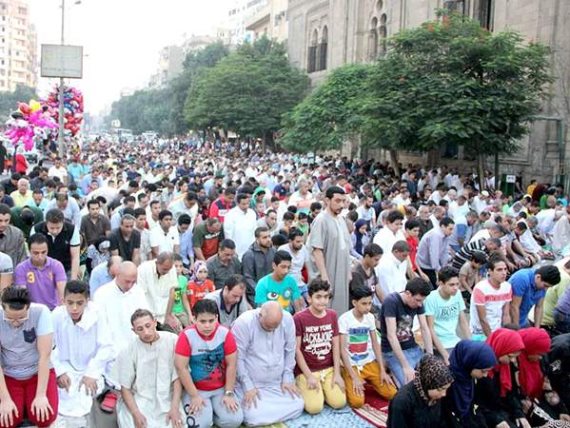Egypt's rahman , or 'mercy,' tables are more of a cultural phenomenon than a religious one. The tables, seen all around Cairo during the Islamic fasting month of Ramadan, provide the city's poor with an open invitation to Iftar, or breakfast, provided by more fortunate citizens.
In Islam, God is known by many names. Allah, of course, is the most known one of these, but He also informed the prophet Mohamed of 99 additional names. Most of these are adjectives that describe one of God's unique attributes, including Al-Rahman, The Merciful One.
The tradition of providing mercy tables for the poor is said to date back to the Fatimid era. The idea is thought to have originated with Prince Ahmed Bin Tolon, who invited his entire entourage to an iftar four years after he took over Egypt, later asking them to show the poorer people of Egypt the same courtesy.
“I believe the tradition was inspired by the prophet Mohamed’s sayings and deeds,” says Sa’d al-Sabbah, a sheikh at a mosque in Cairo's Manial area. “The prophet urged Muslims to provide poor fasting people with an iftar meal–even if it consisted of only a single date fruit and a sip of water–so that both the almsgiver and faster would get Thawab [rewards] for their actions.”
This year, however, the tradition has been much less evident in the capital, with smaller-than-usual Ramadan tables hidden from view in side-streets near Cairo’s wealthier neighborhoods, such as Zamalek, Maadi and Mohandeseen.
“New regulations have restricted our Ramadan tradition,” says Ahmed Sabry, 26, referring to new government rules–ostensibly aimed at traffic reduction–forbidding tables in main streets. “Therefore, we had to figure out new ways to deliver food to those who need it."
As a result, several mosques around the city have invented new means of delivery, dispatching cars laden with lunch boxes to supply poor families in and around Cairo. “We try to deliver food to people who aren't able to come to the tables, like police officers, embassy guards and garbage collectors,” says Sabry.
According to an Egypt Human Development Report for 2010 issued by the United Nations Development Program, some 16.2 million people live in poverty in Egypt–619,000 of them in Cairo alone (the poverty line is currently set at roughly one US dollar per day per capita). Many of these take advantage of the rahman tables to minimize expenses.
“We're used to breaking our fast at these tables,” says Yehia Abdel-Ghani, 44, who brings both his wives and three children to eat at a rahman table in the Cairo district of Zamalek. “I usually keep the rest of my meal to eat with my family for sohour.”
Abdel-Ghani brings his family all the way from Saft al-Laban on the capital's outskirts. “We pay less money for transportation than what we would have paid for a decent iftar,” he adds. “We enjoy a new meal everyday, with chicken and meat, which are items we can’t afford with my small income.”
Um Abdellah, 53, gathered her iftar meal from the table and left without eating. “I take my meal home to my children,” she explains. “They're ashamed of eating at the rahman tables, but I don’t mind bringing them the food.”
Looking at the hot meal –meat cooked with vegetables and rice–Um Abdellah points out, “This food is better than most meals I cook.”
“I don’t have anyone to prepare food for me,“ says 64-year-old Mohamed Mahmoud, who travels from the Qalubiya Governorate to Cairo to eat at a rahman table. “I come here for food because my family is far away, my wife has passed away, and I’m too sick to take care of myself.”
When asked why he would rather travel to rahman tables in Cairo, Mahmoud says, “The tables back home aren't as good as the ones here.” He goes on to point out that Cairo tables feature meat, chicken, dessert and fruit, while the tables back home were considerably less lavish.
The tradition, however, is not without its critics.
“Ramadan isn't a month for people to get lazy,” says Sheikh al-Sabbah. “These tables allow some people who aren't in need to spend Ramadan taking advantage of the charity of others."
The sheikh recalled how he had once been passing by Cairo's Ring Road and saw young men distributing dates and water to passers-by at iftar time. “The sight brought tears of joy to my eyes,” he said. “This is what the Prophet meant when he talked about Thawab."
Nevertheless, the sheikh lauds the good intentions of those running the rahman tables, and this, he says, is what matters most. “When someone goes there because they are in need, then it’s a great tradition,” he says.
Egyptians aren't the only ones turning up to Cairo's tables of mercy.
Michael and John, two Americans in their early twenties, sat among the people enjoying iftar at a Mohandessen table on Monday. “Ana sa’em al-youm (I am fasting today),” says Michael in broken Arabic, adding in English: “I thought I should join this experience with the people around me and enjoy the month of Ramadan the way they do."
Additional reporting by Ghada Mohamed al-Sharief




